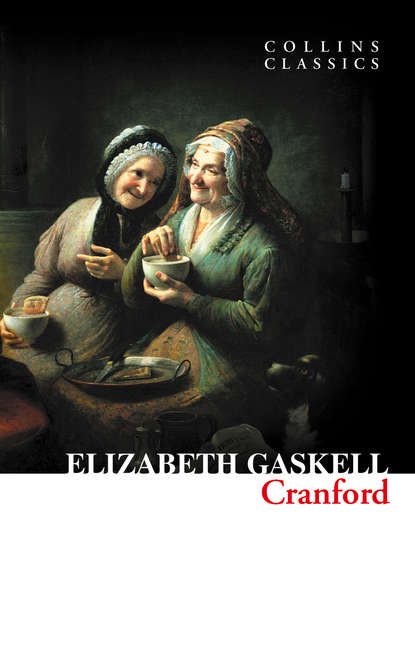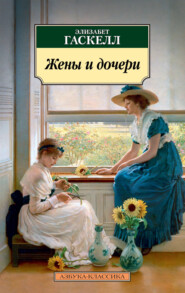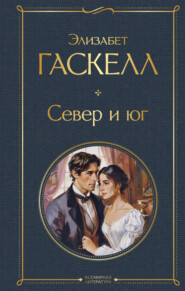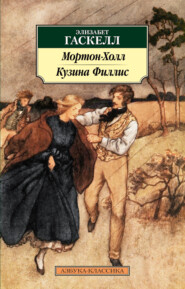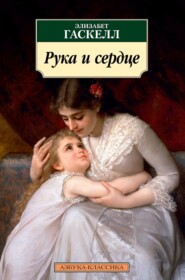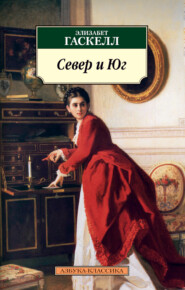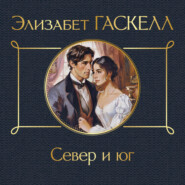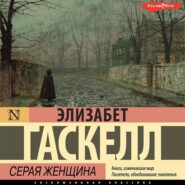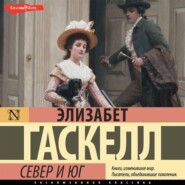По всем вопросам обращайтесь на: info@litportal.ru
(©) 2003-2024.
✖
Cranford
Настройки чтения
Размер шрифта
Высота строк
Поля
“Which do you mean, ma’am? What was it about?”
“I don’t remember what it was about, and I’ve quite forgotten what the name of it was; but it was written by Dr. Johnson, and was very beautiful, and very like what Mr. Holbrook has just been reading.”
“I don’t remember it,” said he reflectively. “But I don’t know Dr. Johnson’s poems well. I must read them.”
As we were getting into the fly to return, I heard Mr. Holbrook say he should call on the ladies soon, and inquire how they got home; and this evidently pleased and fluttered Miss Matty at the time he said it; but after we had lost sight of the old house among the trees, her sentiments towards the master of it were gradually absorbed into a distressing wonder as to whether Martha had broken her word, and seized on the opportunity of her mistress’s absence to have a “follower.” Martha looked good, and steady, and composed enough, as she came to help us out; she was always careful of Miss Matty, and tonight she made use of this unlucky speech—
“Eh! dear, ma’am, to think of your going out in an evening in such a thin shawl! It’s no better than muslin. At your age, ma’am, you should be careful.”
“My age!” said Miss Matty, almost speaking crossly, for her, for she was usually gentle—“my age! Why, how old do you think I am, that you talk about my age?”
“Well, ma’am, I should say you were not far short of sixty: but folks’ looks is often against them—and I’m sure I meant no harm.”
“Martha, I’m not yet fifty-two!” said Matty, with grave emphasis; for probably the remembrance of her youth had come very vividly before her this day, and she was annoyed at finding that golden time so far away in the past.
But she never spoke of any former and more intimate acquaintance with Mr. Holbrook. She had probably met with so little sympathy in her early love that she had shut it up close in her heart; and it was only by a sort of watching, which I could hardly avoid since Miss Pole’s confidence, that I saw how faithful her poor heart had been in its sorrow and its silence.
She gave me some good reason for wearing her best cap every day, and sat near the window, in spite of her rheumatism, in order to see, without being seen, down into the street.
He came. He put his open palms upon his knees, which were far apart, as he sat with his head bent down, whistling, after we had replied to his inquiries about our safe return. Suddenly he jumped up—
“Well, madam! have you any commands for Paris? I am going there in a week or two.”
“To Paris!” we both exclaimed.
“Yes, madam! I’ve never been there, and always had a wish to go; and I think if I don’t go soon, I mayn’t go at all; so as soon as the hay is got in I shall go, before harvest-time.”
We were so much astonished that we had no commissions.
Just as he was going out of the room, he turned back, with his favourite exclamation—
“God bless my soul, madam! but I nearly forgot half my errand. Here are the poems for you you admired so much the other evening at my house.” He tugged away at a parcel in his coat-pocket. “Good-bye, miss,” said he; “good-bye, Matty! take care of yourself.” And he was gone. But he had given her a book, and he had called her Matty, just as he used to do thirty years ago.
“I wish he would not go to Paris,” said Miss Matilda anxiously. “I don’t believe frogs will agree with him; he used to have to be very careful what he ate, which was curious in so strong-looking a young man.”
Soon after this I took my leave, giving many an injunction to Martha to look after her mistress, and to let me know if she thought that Miss Matilda was not so well; in which case I would volunteer a visit to my old friend, without noticing Martha’s intelligence to her.
Accordingly I received a line or two from Martha every now and then; and, about November, I had a note to say her mistress was “very low and sadly off her food;” and the account made me so uneasy that, although Martha did not decidedly summon me, I packed up my things and went.
I received a warm welcome, in spite of the little flurry produced by my impromptu visit, for I had only been able to give a day’s notice. Miss Matilda looked miserably ill; and I prepared to comfort and cosset her.
I went down to have a private talk with Martha.
“How long has your mistress been so poorly?” I asked, as I stood by the kitchen fire.
“Well! I think it’s better than a fortnight; it is, I know; it was one Tuesday, after Miss Pole had been, that she went into this moping way. I thought she was tired, and it would go off with a night’s rest; but no! she has gone on and on ever since, till I thought it my duty to write to you, ma’am.”
“You did quite right, Martha. It is a comfort to think she has so faithful a servant about her. And I hope you find your place comfortable.”
“Well, ma’am, missus is very kind, and there’s plenty to eat and drink, and no more work but what I can do easily—but—” Martha hesitated.
“But what, Martha?”
“Why, it seems so hard of missus not to let me have any followers; there’s such lots of young fellows in the town; and many a one has as much as offered to keep company with me; and I may never be in such a likely place again, and it’s like wasting an opportunity. Many a girl as I know would have ’em unbeknownst to missus; but I’ve given my word, and I’ll stick to it; or else this is just the house for missus never to be the wiser if they did come: and it’s such a capable kitchen—there’s such good dark corners in it—I’d be bound to hide any one. I counted up last Sunday night—for I’ll not deny I was crying because I had to shut the door in Jem Hearn’s face, and he’s a steady young man, fit for any girl; only I had given missus my word.” Martha was all but crying again; and I had little comfort to give her, for I knew, from old experience, of the horror with which both the Misses Jenkyns looked upon “followers”; and in Miss Matty’s present nervous state this dread was not likely to be lessened.
I went to see Miss Pole the next day, and took her completely by surprise, for she had not been to see Miss Matilda for two days.
“And now I must go back with you, my dear, for I promised to let her know how Thomas Holbrook went on; and, I’m sorry to say, his housekeeper has sent me word today that he hasn’t long to live. Poor Thomas! that journey to Paris was quite too much for him. His housekeeper says he has hardly ever been round his fields since, but just sits with his hands on his knees in the counting-house, not reading or anything, but only saying what a wonderful city Paris was! Paris has much to answer for if it’s killed my cousin Thomas, for a better man never lived.”
“Does Miss Matilda know of his illness?” asked I—a new light as to the cause of her indisposition dawning upon me.
“Dear! to be sure, yes! Has not she told you? I let her know a fortnight ago, or more, when first I heard of it. How odd she shouldn’t have told you!”
Not at all, I thought; but I did not say anything. I felt almost guilty of having spied too curiously into that tender heart, and I was not going to speak of its secrets—hidden, Miss Matty believed, from all the world. I ushered Miss Pole into Miss Matilda’s little drawing-room, and then left them alone. But I was not surprised when Martha came to my bedroom door, to ask me to go down to dinner alone, for that missus had one of her bad headaches. She came into the drawing-room at tea-time, but it was evidently an effort to her; and, as if to make up for some reproachful feeling against her late sister, Miss Jenkyns, which had been troubling her all the afternoon, and for which she now felt penitent, she kept telling me how good and how clever Deborah was in her youth; how she used to settle what gowns they were to wear at all the parties (faint, ghostly ideas of grim parties, far away in the distance, when Miss Matty and Miss Pole were young!); and how Deborah and her mother had started the benefit society for the poor, and taught girls cooking and plain sewing; and how Deborah had once danced with a lord; and how she used to visit at Sir Peter Arley’s, and try to remodel the quiet rectory establishment on the plans of Arley Hall, where they kept thirty servants; and how she had nursed Miss Matty through a long, long illness, of which I had never heard before, but which I now dated in my own mind as following the dismissal of the suit of Mr. Holbrook. So we talked softly and quietly of old times through the long November evening.
The next day Miss Pole brought us word that Mr. Holbrook was dead. Miss Matty heard the news in silence; in fact, from the account of the previous day, it was only what we had to expect. Miss Pole kept calling upon us for some expression of regret, by asking if it was not sad that he was gone, and saying—
“To think of that pleasant day last June, when he seemed so well! And he might have lived this dozen years if he had not gone to that wicked Paris, where they are always having revolutions.”
She paused for some demonstration on our part. I saw Miss Matty could not speak, she was trembling so nervously; so I said what I really felt; and after a call of some duration—all the time of which I have no doubt Miss Pole thought Miss Matty received the news very calmly—our visitor took her leave. Miss Matty made a strong effort to conceal her feelings—a concealment she practised even with me, for she has never alluded to Mr. Holbrook again, although the book he gave her lies with her Bible on the little table by her bedside. She did not think I heard her when she asked the little milliner of Cranford to make her caps something like the Honourable Mrs. Jamieson’s, or that I noticed the reply—
“But she wears widows’ caps, ma’am?”
“Oh? I only meant something in that style; not widows’, of course, but rather like Mrs. Jamieson’s.”
This effort at concealment was the beginning of the tremulous motion of head and hands which I have seen ever since in Miss Matty.
The evening of the day on which we heard of Mr. Holbrook’s death, Miss Matilda was very silent and thoughtful; after prayers she called Martha back, and then she stood uncertain what to say.
“Martha!” she said, at last, “you are young”—and then she made so long a pause that Martha, to remind her of her half-finished sentence, dropped a curtsy, and said—
“Yes, please, ma’am; two-and-twenty last third of October, please, ma’am.”
“And, perhaps, Martha, you may some time meet with a young man you like, and who likes you. I did say you were not to have followers; but if you meet with such a young man, and tell me, and I find he is respectable, I have no objection to his coming to see you once a week. God forbid!” she said in a low voice, “that I should grieve any young hearts.” She spoke as if she were providing for some distant contingency, and was rather startled when Martha made her ready, eager answer—
“Please, ma’am, there’s Jem Hearn, and he’s a joiner, making three-and-sixpence a day, and six foot one in his stocking feet, please, ma’am; and if you’ll ask about him tomorrow morning, every one will give him a character for steadiness; and he’ll be glad enough to come tomorrow night, I’ll be bound.”
Though Miss Matty was startled, she submitted to Fate and Love.
CHAPTER 5 Old Letters (#ulink_f17fcc9c-44c1-5163-84f9-a6c2aa4769e2)
I have often noticed that almost every one has his own individual small economies—careful habits of saving fractions of pennies in some one peculiar direction—any disturbance of which annoys him more than spending shillings or pounds on some real extravagance. An old gentleman of my acquaintance, who took the intelligence of the failure of a Joint-stock Bank, in which some of his money was invested, with stoical mildness, worried his family all through a long summer’s day because one of them had torn (instead of cutting) out the written leaves of his now useless bank-book; of course, the corresponding pages at the other end came out as well, and this little unnecessary waste of paper (his private economy) chafed him more than all the loss of his money. Envelopes fretted his soul terribly when they first came in; the only way in which he could reconcile himself to such waste of his cherished article was by patiently turning inside out all that were sent to him, and so making them serve again. Even now, though tamed by age, I see him casting wistful glances at his daughters when they send a whole instead of a half-sheet of notepaper, with the three lines of acceptance to an invitation, written on only one of the sides. I am not above owning that I have this human weakness myself. String is my foible. My pockets get full of little hanks of it, picked up and twisted together, ready for uses that never come. I am seriously annoyed if any one cuts the string of a parcel instead of patiently and faithfully undoing it fold by fold. How people can bring themselves to use india-rubber rings, which are a sort of deification of string, as lightly as they do, I cannot imagine. To me an india-rubber ring is a precious treasure. I have one which is not new—one that I picked up off the floor nearly six years ago. I have really tried to use it, but my heart failed me, and I could not commit the extravagance.
Small pieces of butter grieve others. They cannot attend to conversation because of the annoyance occasioned by the habit which some people have of invariably taking more butter than they want. Have you not seen the anxious look (almost mesmeric) which such persons fix on the article? They would feel it a relief if they might bury it out of their sight by popping it into their own mouths and swallowing it down; and they are really made happy if the person on whose plate it lies unused, suddenly breaks off a piece of toast (which he does not want at all) and eats up his butter. They think that this is not waste.
Now Miss Matty Jenkyns was chary of candles. We had many devices to use as few as possible. In the winter afternoons she would sit knitting for two or three hours—she could do this in the dark, or by firelight—and when I asked if I might not ring for candles to finish stitching my wristbands, she told me to “keep blind man’s holiday.” They were usually brought in with tea; but we only burned one at a time. As we lived in constant preparation for a friend who might come in any evening (but who never did), it required some contrivance to keep our two candles of the same length, ready to be lighted, and to look as if we burned two always. The candles took it in turns; and whatever we might be talking about or doing, Miss Matty’s eyes were habitually fixed upon the candle, ready to jump up and extinguish it and to light the other before they had become too uneven in length to be restored to equality in the course of the evening.
One night, I remember this candle economy particularly annoyed me. I had been very much tired of my compulsory “blind man’s holidays,” especially as Miss Matty had fallen asleep, and I did not like to stir the fire and run the risk of awakening her, so I could not even sit on the rug, and scorch myself with sewing by firelight, according to my usual custom. I fancied Miss Matty must be dreaming of her early life; for she spoke one or two words in her uneasy sleep, bearing reference to persons who were dead long before. When Martha brought in the lighted candle and tea, Miss Matty started into wakefulness, with a strange, bewildered look around, as if we were not the people she expected to see about her. There was a little sad expression that shadowed her face as she recognised me; but immediately afterwards she tried to give me her usual smile. All through tea-time her talk ran upon the days of her childhood and youth. Perhaps this reminded her of the desirableness of looking over all the old family letters, and destroying such as ought not to be allowed to fall into the hands of strangers; for she had often spoken of the necessity of this task, but had always shrunk from it, with a timid dread of something painful. Tonight, however, she rose up after tea and went for them—in the dark; for she piqued herself on the precise neatness of all her chamber arrangements, and used to look uneasily at me when I lighted a bed-candle to go to another room for anything. When she returned there was a faint, pleasant smell of Tonquin beans in the room. I had always noticed this scent about any of the things which had belonged to her mother; and many of the letters were addressed to her—yellow bundles of love-letters, sixty or seventy years old.





